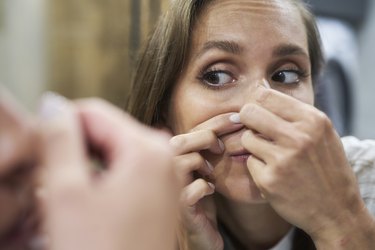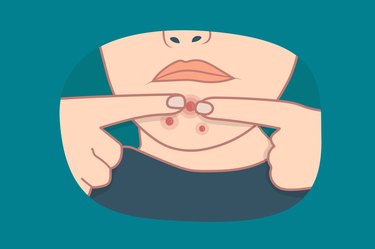
If you struggle with chronic bouts of blemishes and breakouts (and you're well past puberty), you may have heard about a prescription drug called spironolactone (aka, Aldactone or CaroSpir) that can help with hormonal acne.
"Spironolactone was originally a mild diuretic and high blood pressure medication that was developed in the 1950s, but it was discovered to have a secondary effect of blocking testosterone receptors in the skin," dermatologist Kristina Collins, MD, co-founder and CEO of Austin Skin in Austin, Texas, tells LIVESTRONG.com. "It has since been used for decades to treat acne and is also FDA-approved for treatment of the hormonal condition PCOS."
Video of the Day
By blocking certain hormone receptors, the medication decreases your skin's production of sebum, an oily substance that naturally moisturizes your skin but can also clog your pores, leading to acne, explains Howard Sobel, MD, a clinical dermatologic surgeon at Lenox Hill Hospital in New York City.
Research has shown spironolactone to be extremely effective at treating acne — in fact, one June 2017 study in the International Journal of Women's Dermatology found that 85 percent of people taking it experienced a significant improvement in their acne and more than half were completely clear of blemishes during their treatment period.
But as with any drug, it comes with its share of side effects and precautionary notes.
Here, dermatologists share the most important things they want people to know before they start taking spironolactone for acne.
1. It’s Usually Best to Take It in the Morning
Many doctors recommend taking certain medications in the morning simply so you don't forget; it's easier to remember to take something if you always do it soon after you wake up.
But there's another reason why it may be better to take spironolactone in the morning: It's a diuretic, meaning it helps remove excess fluid from the body (similar to the effects of caffeine).
If you take this medication close to bedtime, it may cause you to wake up to urinate (and no one wants to deal with the can't-fall-asleep-after-waking-up-to-pee dilemma).
Of course, there may be exceptions to this, and you might want to tweak your timing based on other side effects you have, so be sure to talk to your doctor about the best timing for you.
Tip
To avoid dehydration or electrolyte imbalances, drink plenty of water while taking spironolactone, especially during exercise or in hot weather, per the Mayo Clinic. A good rule of thumb is to drink about half your body weight in ounces each day (but talk to your doctor about this if you have any underlying heart or kidney conditions).
2. You Shouldn't Get Pregnant While Taking It
Spironolactone is not recommended for anyone planning to get pregnant. The drug has been shown to cause birth defects in animal studies, per Pfizer, the company that makes it.
For that reason, you shouldn't take the drug if you're trying to conceive. And if you're not planning for a baby but are sexually active, you should use some form of contraception to avoid an unplanned pregnancy.
In fact, it might be a good idea for some people to take this med along with hormonal contraceptives. Spironolactone can cause side effects such as breast pain and irregular periods, and hormonal contraceptives can reduce these effects, according to NHS.
Plus, for people with PCOS, taking the two together can help reduce symptoms like acne, excessive hair growth and high blood pressure more effectively than taking just one of the meds alone, according to a May 2022 review in Cureus.
3. Men Should Not Take It
Because spironolactone is an anti-androgen, it interferes with "male" hormones like testosterone.
This can be problematic for certain men, as it can result in something known as gynecomastia, or enlarged breasts, Dr. Collins says, and it can also negatively affect sexual function.
However, spironolactone is sometimes prescribed to reduce testosterone in trans women, according to NHS.
4. You'll Need to Watch Your Potassium Intake
Potassium is an important mineral that helps maintain normal fluid levels in the body, but too much can be dangerous.
Unfortunately, spironolactone can sometimes cause elevated potassium levels, and certain medications or foods can cause this side effect to be more likely, warns Dr. Collins.
The risk is lower if you're young and healthy and higher if you have kidney disease or take medications that affect your blood pressure or electrolyte levels.
Either way, though, it's crucial to talk to your doctor about any medications or supplements you take or plan to take. And you should also keep an eye on the amount of high-potassium foods you eat, including bananas, oranges, spinach, broccoli and sweet potatoes.
"One everyday risk is drinking too much coconut water because the coconut water in combo with the spironolactone can make the elevated potassium issue more likely," Dr. Collins says.
Warning
Taking spironolactone puts you at risk for hyperkalemia (high potassium levels), which can be dangerous, per the Mayo Clinic. Call your doctor right away if you have any of the following symptoms while taking this medication:
- Stomach pain
- Confusion
- Difficulty breathing
- Irregular heartbeat
- Nausea or vomiting
- Nervousness
- Numbness or tingling in the hands, feet or lips
- Weakness or heaviness of the legs
5. It Can Take Months Before You See Results
While many people want a quick fix when it comes to acne, it tends to take a while before you start seeing the full results from spironolactone.
In fact, depending on the dosage and the severity of your acne, Dr. Sobel notes that the average amount of time to start seeing results is typically two to three months.
6. You Can Stop Taking It at Any Time
Some medicines require you to taper off of them slowly to avoid withdrawal or other negative side effects. That's not the case with spironolactone, though — you can stop taking it "cold turkey."
However, Dr. Collins says you may want to make sure you have other acne-control mechanisms like oral contraceptives or topical acne treatments in place before stopping the med so you don't experience a recurrence of your acne.
- American Academy of Dermatology (AAD): SKIN CONDITIONS BY THE NUMBERS
- Kristina Collins, MD, dermatologist and co-founder and CEO of Austin Skin in Austin, Texas
- Howard Sobel, MD, Clinical Dermatologic Surgeon at Lenox Hill Hospital in New York City
- International Journal of Women’s Dermatology: Spironolactone for the treatment of acne in women, a retrospective study of 110 patients☆☆
- Pfzier
- Mayo Clinic: "Spironolactone (Oral Route) Precautions"
- NHS: "Common questions about spironolactone"
- Cureus: "Spironolactone Versus Oral Contraceptive Pills in the Treatment of Adolescent Polycystic Ovarian Syndrome: A Systematic Review"
Is this an emergency? If you are experiencing serious medical symptoms, please see the National Library of Medicine’s list of signs you need emergency medical attention or call 911.


